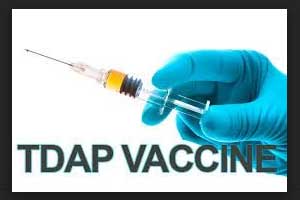- Home
- Editorial
- News
- Practice Guidelines
- Anesthesiology Guidelines
- Cancer Guidelines
- Cardiac Sciences Guidelines
- Critical Care Guidelines
- Dentistry Guidelines
- Dermatology Guidelines
- Diabetes and Endo Guidelines
- Diagnostics Guidelines
- ENT Guidelines
- Featured Practice Guidelines
- Gastroenterology Guidelines
- Geriatrics Guidelines
- Medicine Guidelines
- Nephrology Guidelines
- Neurosciences Guidelines
- Obs and Gynae Guidelines
- Ophthalmology Guidelines
- Orthopaedics Guidelines
- Paediatrics Guidelines
- Psychiatry Guidelines
- Pulmonology Guidelines
- Radiology Guidelines
- Surgery Guidelines
- Urology Guidelines
Tdap vaccine during pregnancy reduces pertussis occurrence in infants

The (tetanus, diphtheria, acellular pertussis) Tdap vaccine is effective for infants whose mothers receive the vaccine during pregnancy, says a study published in the American Journal of Preventive Medicine. There was a 75 percent reduction of pertussis hospitalizations and a 46 percent reduction of any pertussis cases in the first six months of life for infants whose mothers were immunized.
Sylvia Becker-Dreps et.al conducted a study to find the clinical outcomes of the Tdap vaccine in infants over the first 18 months of life.
The study reviewed more than 675,000 pregnancies from 2010-2014 and analyzed insurance claims data to identify the receipt of Tdap during pregnancy. Researchers also looked at hospitalizations and outpatient visits for pertussis in the infants through 18 months of age.
The clinical outcomes show that the immunity passed from mother to fetus during pregnancy protected the infant during the first six months of life before the infant completes the full course of the pertussis vaccine themselves.
The study found that in the first six months of life for infants whose mothers were immunized during pregnancy, there was a 75 percent reduction of pertussis hospitalizations and a 46 percent reduction of any pertussis cases. Further, the study did not find that infants whose mothers received the vaccine had a less effective response to their own pertussis vaccine series, as has been suggested by some immunological studies. Pertussis rates were also lower for infants whose mothers received prenatal Tdap during the third trimester. Infants whose mothers received Tdap before the third trimester also tended to have lower rates of pertussis, but these estimates were imprecise.
The study concluded that infants of mothers who received prenatal Tdap experienced half the rate of pertussis as compared with infants of unimmunized mothers.
These findings further reinforce the CDC's currently recommended "optimal timing" of the Tdap vaccine between 27 and 36 weeks of pregnancy.
For more information log on to https://doi.org/10.1093/ofid/ofx162.163

Disclaimer: This site is primarily intended for healthcare professionals. Any content/information on this website does not replace the advice of medical and/or health professionals and should not be construed as medical/diagnostic advice/endorsement or prescription. Use of this site is subject to our terms of use, privacy policy, advertisement policy. © 2020 Minerva Medical Treatment Pvt Ltd